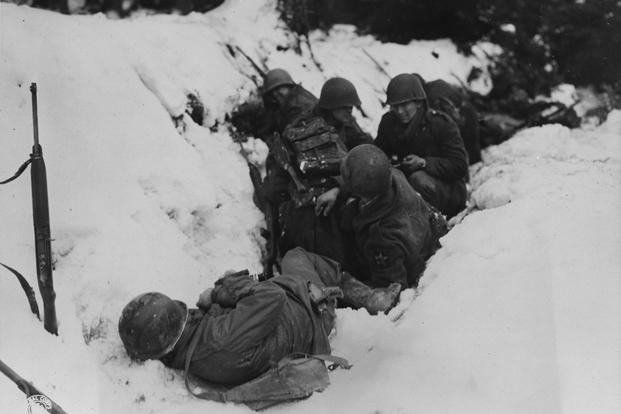The men in his unit called their medic the "gentle giant," for Tech. 5 Alfred L. Wilson towered over the rest of them as he administered the treatments. When Carolyn McKinney set out to learn more about her deceased uncle, the men of 328th Infantry of the 26th Division told her they had loved the quiet country boy from Pennsylvania.
They had innumerable nicknames for him: "Pap," "Big Al," and "Stoop." Such was not always the case in combat units; most medics were draftees with conscientious objector status. While they shared basic training with the infantrymen and tank drivers, missing only weapons drills, many soldiers felt medics "cast a moral shadow over what the infantrymen were training to do," as Stephen Ambrose writes in Citizen Soldiers. "But in combat, they were loved and admired without stint." When shooting started, the cry of "Medic!" was not long in coming, and neither was the medic himself. He would quickly examine, inject, clean, bandage, and evacuate -- not always in that order, and depending on what supplies were at hand.
On Nov. 8, 1944, at Bezange-la-Petite, France, Wilson's unit came under pounding artillery. The Americans suffered heavy casualties; Wilson began administering to the wounded. Suddenly, a shell exploded nearby, laying several soldiers low. Wilson was also seriously wounded, but continued to treat his comrades. He refused to be evacuated by litter bearers, and continued dispensing aid, bandages, and medicine despite his own pain and blood loss. As he lost more and more blood, becoming weaker and weaker, the gentle giant began crawling form patient to patient. When he could no longer move, he gave instructions to men who could. He refused any assistance, giving directions until his whispered voice was silenced and he lapsed into unconsciousness.
Wilson died later from his injuries. His Medal of Honor citation says, "By steadfastly remaining at the scene without regard for his own safety, Cpl. Wilson through distinguished devotion to duty and personal sacrifice helped to save the lives of at least 10 wounded men."














